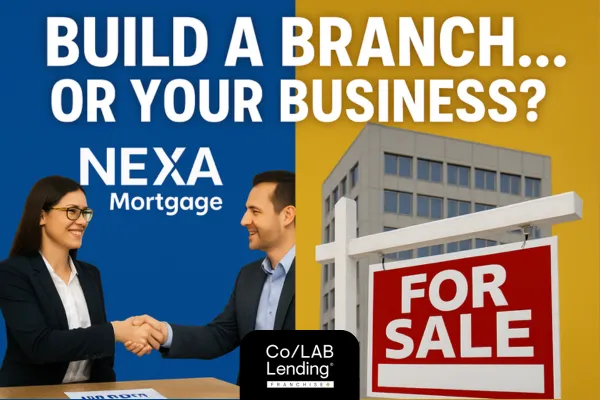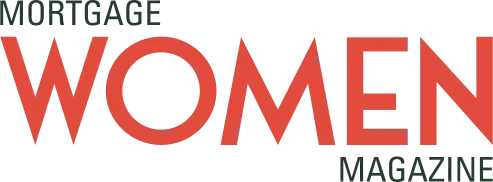BLOG
Mortgage, Real Estate, and Entrepreneurship


Branch vs. Ownership: What Loan Officers Need to Know Before Making the Leap
Branch vs. Ownership: What Loan Officers Need to Know Before Making the Leap
The mortgage broker industry has been buzzing over the past few years—and for good reason. Companies like Nexa Mortgage and others have introduced the “build your branch” model, offering loan officers what seems like the dream: more control, higher commissions, and a piece of something they can call their own. But is it really ownership? And is it the right path for you?
I’m Megan Marsh, and welcome to The Lab—our real estate and mortgage business academy where we empower loan officers, brokers, and real estate pros to grow their businesses and create true financial freedom. Today, we’re diving deep into what it really means to be a branch manager versus a business owner, and what you need to consider if you're thinking about taking the next step in your mortgage career.
What Is the Nexa Mortgage Branch Model?
Let’s start with the basics. Nexa’s “build your branch” model gave loan officers the opportunity to launch a branch under the Nexa umbrella—without starting a brokerage from scratch. Since then, many other companies (Edge, Barrett, C2, and more) have followed suit. On the surface, it sounds great: you run your own branch, keep your commissions, and scale faster.
But here’s the truth you might not hear elsewhere: you don’t actually own anything.
If you don’t hold the company license, you don’t own the business. You’re managing operations, maybe even a team, but at the end of the day, someone else holds the keys. That means someone else is making the big decisions—about systems, marketing, compliance, payouts, and operations. You’re still operating within someone else’s framework.
Yes, you can earn overrides for recruiting. Yes, there’s a bit more freedom than retail. But if that company closes or changes their policies, your “ownership” disappears overnight.
Pros & Cons of the Broker Branch Model
Pros:
Access to an existing brand and infrastructure
Keep more of your commission (after costs)
Lower startup risk than opening a brokerage
Can start recruiting and scaling quickly
Training and tech (if you’re willing to pay for it)
Cons:
You don’t own the business or license
Limited decision-making power
You’re responsible for operational tasks—often without help
Support is lighter than retail (and you’ll pay for it!)
No exit strategy—you can’t sell the business you “built”
Let me be clear: this model can work for the right person. If you’re resourceful, used to figuring things out, and don’t want full business ownership, it might be a fit. But many loan officers—especially those coming from retail—expect more support than they’ll actually get. And when reality hits, they often feel blindsided.
What True Business Ownership Looks Like
Now let’s talk about true ownership. When you open your own mortgage brokerage, you hold the company license. You receive the commission checks. You make every decision—on branding, tech, systems, staff, partners. That means full control and full responsibility.
You’re building something real. Something that can grow with you, generate wealth, and one day, even be sold.
Pros of True Ownership:
Full control over operations and brand
Retain all profits (not just a P&L cut)
Build equity and a legacy you can sell
Unlimited income potential
Cons:
More responsibility and overhead
Requires learning new skills
Startup takes time and effort
Risk of making costly mistakes early on
Let me tell you—it’s not easy. I’ve been there. But the payoff? It’s freedom. It’s legacy. It’s real ownership.
Retail LOs: Here’s What You Need to Know
If you’re leaving retail for better pricing or more freedom, you need to know what you're giving up. In retail, you’re used to HR, compliance, payroll, marketing, training—all done for you. In the broker space, you’re paying for every tool, every support role, every service.
So if you're used to full-service support and don’t want to figure it all out yourself, you need to find the right model that fits your learning curve.
Three Paths Loan Officers Can Take
1. Join an Independent Brokerage
Think of this like a mini retail shop. You’re not the owner, but a good brokerage will offer tech, support, marketing, and compliance. Expect to make 1.25–1.75% per loan depending on your market. Make sure you vet their systems and team.
2. Start a Broker Branch (Like Nexa)
You’ll get more control, better commission splits, and options to recruit and scale. But you’ll need to be very hands-on. You’ll likely pay a per-file fee and cover your own ops team. Many loan officers get overwhelmed here, especially in the first 3–6 months.
3. Open Your Own Brokerage (with Help)
This is where I believe the future is heading. Full ownership, full profit, full freedom—but with the right support system. That’s why we created Co/LAB’s Broker-in-a-Box Franchise and our Transition Team.
A Smarter Way to Own: The Co/LAB Transition Model
At Co/LAB, we saw a big gap: too many LOs jumping into the broker world without the tools or support they need to succeed. That’s why we created two programs:
🧠 The Transition Team
You join as a sponsored LO under one of our licensed Co/LAB brokerages. You learn how to originate as a broker while getting hands-on support from a team that understands your retail background. During this time, we help you prepare to open your own brokerage.
🏗️ Broker-in-a-Box Franchise
Once you’re ready, you open your own Co/LAB franchise—with all the systems, forms, tech, compliance, and training already done for you. You own the license, the book of business, and the brand equity. You keep more revenue and finally start building the legacy you’ve always wanted.
This hybrid model allows for a smooth transition, eliminating the chaos and confusion many LOs experience when they go it alone.
The Bottom Line
If you’re a loan officer looking to grow, build wealth, and eventually own your own business—don’t jump into a model you don’t understand. The branch model works for some, but it’s not true ownership.
If you’re serious about legacy, freedom, and long-term income, let’s talk. Our mission at Co/LAB is to help professionals like you make the leap into ownership the right way—with guidance, structure, and community.
Let’s build something real together.
👉 Ready to take the next step? Schedule a Zoom with our team and explore your options.
Frequently Asked Questions (FAQ)
Q: Is being a branch manager at Nexa considered owning a business?
No. As a branch manager under a company like Nexa, you don't own the business or the license. You operate under someone else's legal structure, meaning you have limited control and no equity.
Q: What’s the main difference between a broker branch and true ownership?
The biggest difference is control and equity. True ownership means you hold the company license, make all the decisions, keep 100% of the profits, and can eventually sell the business. A broker branch offers flexibility but not true control or asset value.
Q: I’m coming from retail—how much support should I expect in the broker world?
Far less than retail unless you join the right team. Many brokers underestimate how much they were relying on their retail back office. In the broker world, you pay for or build your own systems—unless you join a support structure like Co/LAB.
Q: How do I know I’m ready to own my own brokerage?
If you’re consistently closing deals, have built a referral network, and are eager to learn the business side of lending, you might be ready. That’s why we created our Transition Team—to help you ease into ownership with training and mentorship.
Q: What’s the investment or cost of starting my own brokerage?
Costs vary by state and how much infrastructure you want to build. You’ll need to budget for licensing, tech, compliance, and staffing. Our Broker-in-a-Box franchise simplifies this by bundling everything you need into one ready-to-go model.
Q: Can I talk to someone before making a decision?
Absolutely. Click here to schedule a Zoom with our team. We’ll walk you through your options and help you decide if brokerage ownership is right for you.
Megan Marsh
Founder, Co/LAB Broker Concierge
In Case You Missed Our Previous Blogs & YouTube Videos..
Read Here: How to Originate DSCR Loans in 2025: A Step-by-Step Guide for Mortgage Brokers
DSCR loans are one of the hottest niches in 2025—and most loan officers are missing out. In this blog, I break down exactly how mortgage brokers can tap into this booming market, close deals faster, and work with real estate investors across multiple states (without needing a license in each one).
Learn how to structure DSCR loans, build your lender panel, avoid common pitfalls, and attract investor clients with smart marketing strategies.
Read Here: The 10 Hardest States to Start a Mortgage Company (And How to Navigate Them)
Thinking about launching your own mortgage brokerage? Be warned—some states make it seriously hard to get licensed. From sky-high net worth requirements to years of experience and mandatory in-state offices, these states throw every roadblock in your way.
In this blog, I break down the 10 hardest states to get licensed in, explain exactly why they’re so tough, and show you how to navigate the red tape like a pro—even if your state made the list.
Mortgage Broker Support
Need help starting your mortgage business? Our Mortgage Broker Concierge Team is here to assist you!
If you’re curious about how we can help you simplify your operations beyond what our videos offer and want to know how you can make launching or running your brokerage stress-free, the link below explains everything. No fluff, no “exclusive training” gimmicks—just a straightforward way to see how we work with brokers to take backend tasks off their plates. Check it out here: https://colablendingfranchise.com/book-a-discovery-call

Branch vs. Ownership: What Loan Officers Need to Know Before Making the Leap
Branch vs. Ownership: What Loan Officers Need to Know Before Making the Leap
The mortgage broker industry has been buzzing over the past few years—and for good reason. Companies like Nexa Mortgage and others have introduced the “build your branch” model, offering loan officers what seems like the dream: more control, higher commissions, and a piece of something they can call their own. But is it really ownership? And is it the right path for you?
I’m Megan Marsh, and welcome to The Lab—our real estate and mortgage business academy where we empower loan officers, brokers, and real estate pros to grow their businesses and create true financial freedom. Today, we’re diving deep into what it really means to be a branch manager versus a business owner, and what you need to consider if you're thinking about taking the next step in your mortgage career.
What Is the Nexa Mortgage Branch Model?
Let’s start with the basics. Nexa’s “build your branch” model gave loan officers the opportunity to launch a branch under the Nexa umbrella—without starting a brokerage from scratch. Since then, many other companies (Edge, Barrett, C2, and more) have followed suit. On the surface, it sounds great: you run your own branch, keep your commissions, and scale faster.
But here’s the truth you might not hear elsewhere: you don’t actually own anything.
If you don’t hold the company license, you don’t own the business. You’re managing operations, maybe even a team, but at the end of the day, someone else holds the keys. That means someone else is making the big decisions—about systems, marketing, compliance, payouts, and operations. You’re still operating within someone else’s framework.
Yes, you can earn overrides for recruiting. Yes, there’s a bit more freedom than retail. But if that company closes or changes their policies, your “ownership” disappears overnight.
Pros & Cons of the Broker Branch Model
Pros:
Access to an existing brand and infrastructure
Keep more of your commission (after costs)
Lower startup risk than opening a brokerage
Can start recruiting and scaling quickly
Training and tech (if you’re willing to pay for it)
Cons:
You don’t own the business or license
Limited decision-making power
You’re responsible for operational tasks—often without help
Support is lighter than retail (and you’ll pay for it!)
No exit strategy—you can’t sell the business you “built”
Let me be clear: this model can work for the right person. If you’re resourceful, used to figuring things out, and don’t want full business ownership, it might be a fit. But many loan officers—especially those coming from retail—expect more support than they’ll actually get. And when reality hits, they often feel blindsided.
What True Business Ownership Looks Like
Now let’s talk about true ownership. When you open your own mortgage brokerage, you hold the company license. You receive the commission checks. You make every decision—on branding, tech, systems, staff, partners. That means full control and full responsibility.
You’re building something real. Something that can grow with you, generate wealth, and one day, even be sold.
Pros of True Ownership:
Full control over operations and brand
Retain all profits (not just a P&L cut)
Build equity and a legacy you can sell
Unlimited income potential
Cons:
More responsibility and overhead
Requires learning new skills
Startup takes time and effort
Risk of making costly mistakes early on
Let me tell you—it’s not easy. I’ve been there. But the payoff? It’s freedom. It’s legacy. It’s real ownership.
Retail LOs: Here’s What You Need to Know
If you’re leaving retail for better pricing or more freedom, you need to know what you're giving up. In retail, you’re used to HR, compliance, payroll, marketing, training—all done for you. In the broker space, you’re paying for every tool, every support role, every service.
So if you're used to full-service support and don’t want to figure it all out yourself, you need to find the right model that fits your learning curve.
Three Paths Loan Officers Can Take
1. Join an Independent Brokerage
Think of this like a mini retail shop. You’re not the owner, but a good brokerage will offer tech, support, marketing, and compliance. Expect to make 1.25–1.75% per loan depending on your market. Make sure you vet their systems and team.
2. Start a Broker Branch (Like Nexa)
You’ll get more control, better commission splits, and options to recruit and scale. But you’ll need to be very hands-on. You’ll likely pay a per-file fee and cover your own ops team. Many loan officers get overwhelmed here, especially in the first 3–6 months.
3. Open Your Own Brokerage (with Help)
This is where I believe the future is heading. Full ownership, full profit, full freedom—but with the right support system. That’s why we created Co/LAB’s Broker-in-a-Box Franchise and our Transition Team.
A Smarter Way to Own: The Co/LAB Transition Model
At Co/LAB, we saw a big gap: too many LOs jumping into the broker world without the tools or support they need to succeed. That’s why we created two programs:
🧠 The Transition Team
You join as a sponsored LO under one of our licensed Co/LAB brokerages. You learn how to originate as a broker while getting hands-on support from a team that understands your retail background. During this time, we help you prepare to open your own brokerage.
🏗️ Broker-in-a-Box Franchise
Once you’re ready, you open your own Co/LAB franchise—with all the systems, forms, tech, compliance, and training already done for you. You own the license, the book of business, and the brand equity. You keep more revenue and finally start building the legacy you’ve always wanted.
This hybrid model allows for a smooth transition, eliminating the chaos and confusion many LOs experience when they go it alone.
The Bottom Line
If you’re a loan officer looking to grow, build wealth, and eventually own your own business—don’t jump into a model you don’t understand. The branch model works for some, but it’s not true ownership.
If you’re serious about legacy, freedom, and long-term income, let’s talk. Our mission at Co/LAB is to help professionals like you make the leap into ownership the right way—with guidance, structure, and community.
Let’s build something real together.
👉 Ready to take the next step? Schedule a Zoom with our team and explore your options.
Frequently Asked Questions (FAQ)
Q: Is being a branch manager at Nexa considered owning a business?
No. As a branch manager under a company like Nexa, you don't own the business or the license. You operate under someone else's legal structure, meaning you have limited control and no equity.
Q: What’s the main difference between a broker branch and true ownership?
The biggest difference is control and equity. True ownership means you hold the company license, make all the decisions, keep 100% of the profits, and can eventually sell the business. A broker branch offers flexibility but not true control or asset value.
Q: I’m coming from retail—how much support should I expect in the broker world?
Far less than retail unless you join the right team. Many brokers underestimate how much they were relying on their retail back office. In the broker world, you pay for or build your own systems—unless you join a support structure like Co/LAB.
Q: How do I know I’m ready to own my own brokerage?
If you’re consistently closing deals, have built a referral network, and are eager to learn the business side of lending, you might be ready. That’s why we created our Transition Team—to help you ease into ownership with training and mentorship.
Q: What’s the investment or cost of starting my own brokerage?
Costs vary by state and how much infrastructure you want to build. You’ll need to budget for licensing, tech, compliance, and staffing. Our Broker-in-a-Box franchise simplifies this by bundling everything you need into one ready-to-go model.
Q: Can I talk to someone before making a decision?
Absolutely. Click here to schedule a Zoom with our team. We’ll walk you through your options and help you decide if brokerage ownership is right for you.
Megan Marsh
Founder, Co/LAB Broker Concierge
In Case You Missed Our Previous Blogs & YouTube Videos..
Read Here: How to Originate DSCR Loans in 2025: A Step-by-Step Guide for Mortgage Brokers
DSCR loans are one of the hottest niches in 2025—and most loan officers are missing out. In this blog, I break down exactly how mortgage brokers can tap into this booming market, close deals faster, and work with real estate investors across multiple states (without needing a license in each one).
Learn how to structure DSCR loans, build your lender panel, avoid common pitfalls, and attract investor clients with smart marketing strategies.
Read Here: The 10 Hardest States to Start a Mortgage Company (And How to Navigate Them)
Thinking about launching your own mortgage brokerage? Be warned—some states make it seriously hard to get licensed. From sky-high net worth requirements to years of experience and mandatory in-state offices, these states throw every roadblock in your way.
In this blog, I break down the 10 hardest states to get licensed in, explain exactly why they’re so tough, and show you how to navigate the red tape like a pro—even if your state made the list.
Mortgage Broker Support
Need help starting your mortgage business? Our Mortgage Broker Concierge Team is here to assist you!
If you’re curious about how we can help you simplify your operations beyond what our videos offer and want to know how you can make launching or running your brokerage stress-free, the link below explains everything. No fluff, no “exclusive training” gimmicks—just a straightforward way to see how we work with brokers to take backend tasks off their plates. Check it out here: https://colablendingfranchise.com/book-a-discovery-call
Are You Ready...
to Start Building a Legacy and Not Just a Business?
AS FEATURED IN:







Co/LAB Corporate
8795 Peach Street,
Erie, PA 16509
Company
Resources
Learn more about who we are, what we do, and how we can help you by visiting our other company websites.
www.becomeamortgagebroker.info





